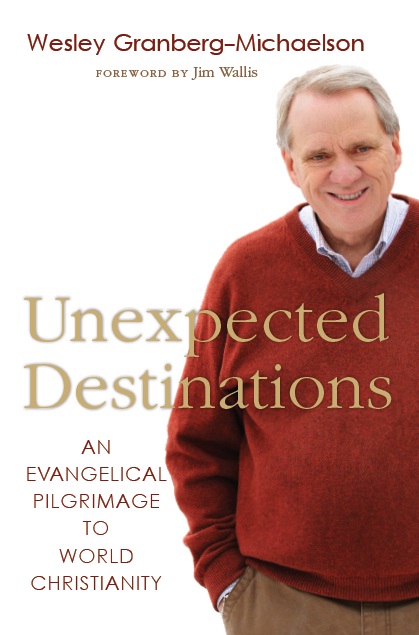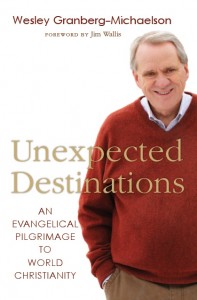Unexpected Destinations II: A Conversation with Wes Granberg-Michaelson and Friends
Read the first part of this interview
Read the third part of this interview
Read the fourth part of this interview
Read the fifth part of this interview
This week on ecclesio, a group converses on the new book by Wes Granberg-Michaelson, Unexpected Destinations. Today, we discuss the process of change and how churches respond to or react within the culture. Yesterday’s post can be found here.
CHR: You quoted Henri Nouwen , Wes, on change. It relates to what we have been discussing on the process of change and the role of human relationships. It gets back to relationships, clearly, and shared values. But also you brought in the issue of culture. I worked with the RCA for a number of years as a fish out of water, and came up against the culture often through my own ignorance. The RCA is still in some ways an ethnocentric denomination. How does the issue of culture play in denominational life and change in denominations?
WGM: I think it’s huge. I am not Dutch either, I am Norwegian! The part that you quote there on page 190, you picked up on some pretty important points. It is a section on changing the way we change. Because of the era in which I grew up, my first impulse to change is to change the structure — because it was clear that the structure was inefficient, and crazy, and you had to get them right to do better. What I discovered, after a while, was that changing the culture was far more important and far more difficult than changing the structure. Structural changes focus on who works with whom; cultural changes focus on the shared values and the building of shared values undergirding the work.
It’s important to understand what we mean when we use this word, culture. It’s not just a matter of ethnicity and race, although that’s clearly a big part, especially for a denomination like the RCA. Adam could speak to this from the Covenant Church. The Covenant Church has done work that the RCA has learned a lot from; the Covenant Church has done an extraordinary job in breaking way from its dominant Swedish culture, to the point now that it has over 20% really vibrant African American congregations. Those kind of changes – and you see the same thing in the RCA when we adopted the Commitment to a Multiracial Future and the Belhar Confession – you see the same kind of movement. A lot of the way we do business we think is driven by polity or doctrine, but in fact is driven by the fact that we are a bunch of Swedes, or Dutch, or whatever, who are just comfortable doing business in a particular way. So the more diverse you become the more conflict will arise in the way you make decisions, all of which becomes crucially important. But it’s more than just ethnicity. It’s what we expect from one another, what we value from each other at a meeting of the classis or the local body. You expect that you are going to simply be doing business, using Robert’s Rules, or will you expect that you come together to build relationships, figure out the barriers to relationship and barriers to things going well in congregations, figuring out how to build trust, making space to ask what the Spirit is doing in our midst, how God is moving, and as we move forward expecting accountability and support from one another? Making those kinds of changes in expectations will move people to think about meetings differently. It is producing those kinds of changes in culture that makes it possible to move toward a missional future. These kinds of things have to start with the staff, because if the church doesn’t see it happening there they aren’t going to trust that it can happen.
DH: I agree. The interesting thing about culture in institutional life is that it at least always one generation behind the current culture; most denominations are at least three generations behind, being built by the Builder and Silent generations, and with the responsibility for church life that occurred among Boomers who left the church in huge numbers, except for folks like Wes and I, who didn’t get the memo, obviously! We inherited a church that was still functioning on the basis of earlier generations that worked for them but didn’t work for us and certainly doesn’t work for Millenial or Gen X people. I think there’s always a tension when a new leader comes into an organization, and it’s at least one of generation, and at times it’s much more than that. Until you can get some alignment between the context you’re trying to serve, the culture at large, and the culture in the organization, you are really wasting a lot of energy.
AP: I humbly echo the comments Wes made. It used to be someone like myself, with no Scandanavian background, was the only diversity you would find in the Covenant Church. Thankfully, that was in the past. The reaction at first was pretty reactionary, because we knew that our life was not reflective of the Kingdom of God, and yet there was resistance to change. And now, thankfully, we are being able to grow because we are growing, we are planting new, vibrant churches, multiethnic churches with many strong commitments.
There is also the issue of culture and the efforts of the evangelical world to impact culture. I think this is really important, because what does it mean when a group that has been a subculture tries to impact the wider culture? With our own signs and symbols, brands, etc. that don’t really impact the wider culture – how does the church impact the wider culture in ways that bring a redemptive quality to culture? I think this needs to be thought about as well.
CHR: Can we go a little further into that? I was thinking about your comment, Dick, about how the church is behind the culture. The situation now for many mainline denominations is one of decline – which means we aren’t touching or engaging people in ways that make a difference, that they can hear. And in response to the reality of decline, one move that denominations can make is to retrench. Retrenching can happen in response to a sense that in the midst of decline, we have to figure out who we are and claim that identity and make that central. What has been your experience, any of you, of retrenching in denominational life? What are faithful responses to this kind of tendency, if you have seen it take place?
DH: This reminds me of the old joke about the Baptist preacher, who was asked if he believed in infant baptism, and replied that not only did he believe in it, he had actually seen it done!
Yes, I have certainly seen it, and I think that it’s a sign of death. I’m reminded of the old song, Just As I Am. We have to discover who we are as a part of discovering who we’re called to be, and God is very infrequently satisfied with “just as I am”. There’s got to be a step beyond that. Retrenching is going back in the trench, and it’s a step toward death. In the trench you’re going to be buried.
WGM: I reflect much of the same. There’s a lot of emphasis on questions of identity in denominational life. In our world where religious identity is getting flattened – where particular denominational identity just doesn’t matter – there is effort to figure out and reclaim who we are. Some of that can be helpful, if the point is to discover who we are so we can move toward a missional future. This does have to come out of a clear sense of who we are. There’s an RCA pastor, Harold Corber, who I often quote, who said “You have to move through tradition to get to mission.” I have learned over my time the wisdom in that. It’s not just a matter of jettisoning the past – some people want to chuck the past to face the future. That’s not helpful. You have to figure out how to mind the past to get to the future, to let it take you toward the future into which you are called. The danger is when the search for identiy becomes a closing in on oneself. It is helpful, though, to figure out what are the particular things from our past that can help and strengthen us as being a resident witness as we think about the future – and what is the baggage that is holding us back. The issues can be helpful if you frame them in the context of mission.
AP: Wes’ point on the sense of mission and moving through tradition is really critical in light of the growth I talked about in the Covenant Church and other churches. As someone who really loves the tradition, I love the old Swedish hymns, not because they’re Swedish or my grandfather sang them, because I didn’t grow up in this church. I love them because they contain really rich theology and a deep sense of the overwhelming power of God’s love for us and for creation. This is what makes us a peculiar kind of evangelical denomination. It is, for us, an awareness, not of God’s wrath but God’s overwhelming love for us that moves us – and then to seek out others and share with them that good story of God’s redemptive love for the whole world. You can lose that if you throw out the Swedish hymnal – and I have seen that happen when younger pastors who get frustrated with the pace of change decide to get rid of the liturgies and prayers and hymns that are important in the tradition. That really complicates our memory and makes us forget who we are. It isn’t that we are Swedish, although some are Swedish – it is that we are a people who have been befriended by God and want to make sure that story is shared with so many others.


